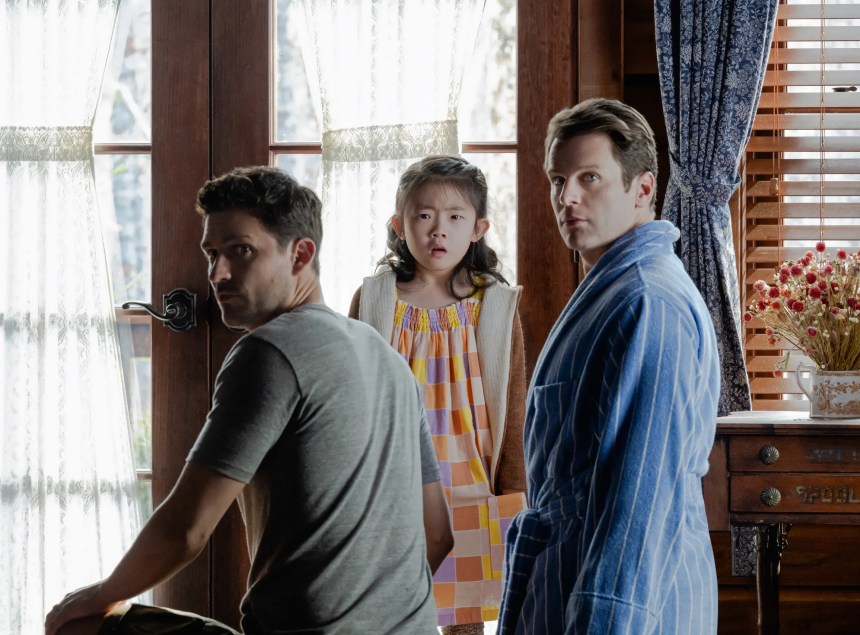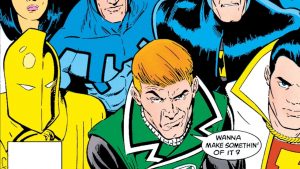
WILL YOU MAKE A CHOICE…..
Director M. Night Shyamalan has always been the case of cinematic scrutiny and sometimes movie frustration when it comes to his feature films. While he had directed movies like 1992’s Praying with Anger and 1998’s Wide Awake, many moviegoers were introduced to Shyamalan with his 1999 supernatural horror The Sixth Sense, which starred actor Bruce Willis and young upcoming actor Haley Hoe Osmond. From his critical acclaim from both critics and moviegoers of that movie, Shyamalan followed The Sixth Sense with the 2000 superhero movie Unbreakable, which starred Bruce Willis again as well as actor Samuel L. Jackson in the lead roles. While not as met with universal acclaim as he did his previous film, Shyamalan’s Unbreakable was well-received and has gain quite a cult following amongst its viewers. After Unbreakable, however, Shyamalan’s movies were less-than satisfactory, with many (critics and moviegoing audience viewers alike) finding the films like 2002’s sci-fi thriller Signs, 2004’s psychological mystery The Village, 2006’s fantasy drama The Lady in the Water, and 2008’s post-apocalyptic psychological film The Happening to be subpar and weaker movies to what both The Sixth Sense and (to a lesser extent) Unbreakable were able to achieve in movie entertainment, with some sighting that Shyamalan’s weak story / script handling as well as his commonplace “twists” that appear at the end of the film. Even worse were some completely deplorable cinematic motion pictures, including 2010’s The Last Airbender and 2013’s After Earth, which were met with both critical and commercial box office failures. In 2016, Shyamalan released Split, a psychological horror film that starred actor James McAvoy, who regained the public’s interest in the director’s movie, citing the feature as a welcomed “returned to form” for Shyamalan’s works as well as receiving critical positive reviews and praise alike and garnishing roughly $278 million against its $9 million production budget. This was then followed up with 2019’s Glass, which tied the events of Spilt and Unbreakable in a trilogy fashion and explored the origin stance of a superhero; culminating in a finale of this narrative. Despite mixed reviews, however, Glass did manage to rake in a large sum at the box office, which deemed it a success. Now, two years after his last film (Old) Universal Pictures (along with Blinding Edge Pictures and FilmNation Entertainment) and director M. Night Shyamalan present his fifteenth feature film with the release of Knock at the Cabin. Does this movie live up to the hype of Shyamalan’s classic nuances or does it fall prey to the director’s middling endeavors?
THE STORY
Married couple Eric (Jonathan Groff) and Andrew (Ben Aldridge) are looking for a quiet get away from their lives, electing to bring their seven-year-old daughter, Wen (Kristen Cui), to their remote cabin in the woods for rest and relaxation. Breaking into their tranquil vacation time is Leonard (Dave Bautista), a stranger who makes contact with Wen, who is joined by Redmond (Rupert Grint), Sabrina (Nikki Amuka-Bird), and Adriane (Abby Quinn). With a foreboding stance of seeking them out, the foursome break into their dwelling, using physical force to overwhelm the family and tie-up Eric and Andrew, looking to keep them contained as they reveal their intent. What might be a home invasion, the couple soon are informed that they are a part of an impending apocalypse, with Leonard and his gang requiring a personal (and willing) sacrifice to stopping doomsday calamity, giving them four chance to agree to a death before the end of the world arrives. While the two men refuse to believe such a story, Leonard is determined to share his truth, trusting in the power of his visions as consequences of their actions demonstrate the power of Eric and Andrew’s incompliance.
THE GOOD / THE BAD
Borrowing some lines for my opening paragraph and this one from my review of Glass….Like many out there, I discovered director M. Night Shyamalan’s work from his most popular film to date (i.e. The Sixth Sense) when it was released back in 1999 (I remember seeing it in theaters and was completely captivated by it). It was definitely something truly special, especially coming from the particular age of films being released around that era (i.e the late 90s / early 2000s), and the movie’s ending twist was completely awesome. Thus, it’s safe to say that The Sixth Sense is one of Shyamalan’s best movies (and I think many will agree to that). Unbreakable (his follow-up film after The Sixth Sense) wasn’t as good as his previous film, but was still a solid motion picture, which (like I mentioned above) does have a cult following, especially those who have a certain flavor for comic book superheroes nuances. Plus, both Willis and Jackson gave excellent performances in the movie. After that, however, Shyamalan’s feature films were mostly mediocre and were pretty “blah”; following a lot of the same tropes that accompany the director’s style (i.e. a secret hidden “twist” at the movie’s ending). Even looking beyond that, the movie themselves were averagely subpar, ranging from okay-ish to terrible. Don’t even get me started on The Last Airbender and how much of a disservice the movie was to the cartoon series that inspired it.
Thus, my interest in seeing Shyamalan’s movies waned over the years…. until that was Spilt was released and sort of “renewed” my interest in the director’s filmmaking. Whatever you may think of Shyamalan’s classic “twist” tropes, Spilt was well-acted (most notably thanks to actor James McAvoy’s solid performance and quite an engaging movie to follow. Personally, I loved it and thought it was a great film. 2019’s Glass, the follow-up to Spilt, was another great entry in Shyamalan’s work, with the feature acting as a sequel to the previous film as well as 2000’s Unbreakable. There were some few minor criticisms that I had with the movie, including the missed opportunity potential the feature had, but, for the most part, it was a well-met film that acted as a “origin story finale”. As a sidenote, I didn’t mention Shyamalan’s 2022 film Old because I didn’t see it in theaters (thought it was a little too creepy for me), so I really can’t base my opinions on the feature. Regardless, whether you love him or hate him, M. Night Shyamalan’s project have always been a fixed center point of storytelling with recognizable acting talent and some of the director’s signature style of plot twisting.
This brings me back around to talking about Knock at the Cabin, a 2023 psychological horror thriller endeavor and Shyamalan’s latest project. I think it was sometime after the release of Old that it was announced that Shyamalan’s next movie would be titled Knock at the Cabin and would be based off the book “The Cabin at the End of the World” by Paul G. Tremblay. I sort of do remember seeing Tremblay’s novel on the shelves where I work, but I didn’t really get to check out the synopsis of the book (aka reading the back cover of it) or anything like that. Thus, i didn’t check it out. Although, given the premise of the movie, I maybe should’ve check out the novel out. Guess that’s a missed opportunity. Anyway, after the film was announced, the film’s cast slowly began to assemble, including Jonathan Groff, Rupert Grint, Ben Aldridge, and Dave Bautista. From there, the film’s movie trailer began to appear online (and in theaters), with the preview showcasing that “oh-so-classic” touch of Shyamalan’s style on unsettledness and intrigue. To me, it certainly felt like that from the trailer alone and I was interested to see the film when it was scheduled to come out. I did see the movie (in theaters) a week or two after its theatrical release back in February, but, due to my work schedule and back catalogue of other movie reviews that I needed to complete beforehand, I had to delay getting my review done for this particular movie. Now, with a lot of other reviews done and out of the way, I am finally ready to share what I thought of Shyamalan’s latest film? And how was it? Well, it was just merely okay. Despite having an terrifying and alluring premise and some good acting talents involved on the movie, Knock at the Cabin feels like an above average middling endeavor that gets lost within its thematic making and character development. It wasn’t M. Night’s worst feature to date, but it’s hardly his best, with the feature stuck somewhere in-between those two extremes.
As a sidenote, as I mentioned, I didn’t get a chance to read Tremblay’s book before the movie, so I can’t compare what was change, added, or changed between the film adaptations. Thus, my review is solely going to be based on my viewing experience of the movie and not so much what was altered for the film.
As stated, Shyamalan returns to the director’s chair for Knock at the cabin, with the director approaching Tremblay’s novel with the same type of vim and vigor as he would with his own original material. What I mean is that the movie’s premise (or rather the story being told) is a perfect fit for Shyamalan to helm and presented in a cinematic light, which definitely features those ambiguous and “gray area” moments that keep the narrative path uneasy and a bit bizarre within the scenario. In that regard, I think that Shyamalan does succeed, with his vision for Knock at the Cabin being a surreal (and sometimes intense) chance “what if” encounter. That’s basically what the whole movie is…..a what if. What if certain events (life-altering / apocalyptic ones) had a significant weight on the action and reaction that you might have on a certain circumstance. That’s pretty much the “base” of the story being told, and Shyamalan knows this and approach this question with a sense of morality issues and of the age-old positioning of “choice vs. consequence”. In addition, much like 10 Cloverfield Lane, Shyamalan makes the movie have a sense of isolation, with “the cabin” being the primary setting for the main’s setting and the surrounding woods make the characters secluded and cut off from the rest of the world. This, of course, plays up the “what if” scenario quite well, with the movie showing world events happen (via TV broadcast) and not knowing if said events are true or fabricated.
While some will argue that the main plot of the story is quite thin at times, Shyamalan utilizes the acting talent in a more focused way to keep the event of the feature moving forward. Thus, the reliance of the actors can be a bit of a “double edge” sword tactic, which has some good and bad merits, but, for the positives, it definitely gives the talent involved (mostly the main leads) plenty to toil around with on their own personal performances. In the end, while not his best, Knock at the Cabin still manages to keep Shyamalan’s style of filmmaking very much alive and makes the entire project feel like a bizarre “what if” scenario that ultimately proves some thought-provoking moments of belief and rationalizing, while also dealing with the fear of isolation.
For its presentation, Knock at the Cabin is pretty good for the movie needs to convey its story. What does that mean? Well, given the nature of how the film plays out and within its primary setting (i.e. the cabin), the movie doesn’t require an extensive and / or elaborate production budget to go crazy for. Thankfully, Shyamalan’s minimalistic approach of focusing on the characters definitely helps the movie achieve a very intriguing narrative and makes the background feel more secondary. That’s not to say that setting that the film provides is bad or uninteresting, for the director utilizes the backdrop of the forest and the lonely cabin as an isolation point / feeling, which helps build that feeling of being “cut off” from the rest of the world; something that keeps the tension building as certain events play out. Thus, the film’s “behind the scenes” team, including Dave Kellom (art direction), Naaman Marshall (production design), Jeno Delli Colli and Karen Frick (set decorations), and Caroline Duncan (costume designs) should be praised for their efforts made throughout the feature, which helps convey the cozy, yet extremely closed off cabin in the woods nuances. The atmospheric nature of that said isolation can also be felt in the cinematography work by Jarin Blaschke and Lowell A. Meyer, which creates that impression of cinematic suspense through the usage of various dynamic camera shots and angles in and out of the movie’s runtime. Lastly, the film’s score, which was composed by Herdis Stefansdottir, is pretty good and delivers some intense and unnerving compositions throughout the scenes, which helps build up the suspense, while also playing up some emotions within scenes that need the somber and sobering dialogue driven sequences.
Unfortunately, Knock at the Cabin does have its fair share of problems within the feature, which doesn’t necessarily make the film the “bottom of the barrel” of Shyamalan’s releases, but certainly does show the inconsistent (and sometimes) frustration nature that the director showcases within his productions. How so? Well, for starters, the movie itself seems rather empty in a few key areas, which is combination of the film’s script and from Shyamalan’s direction. From the script standpoint, the story being told is (as mentioned) interesting because it’s a classic home invasion narrative, yet with a Shyamalan’s twist. It’s definitely engaging, but feels like there’s just a lot of “surface level” substance and not enough actual grit to the proceedings. The film’s screenplay, which was penned by Shyamalan as well as Steve Desmond, certainly does it best to try and convey what Tremblay’s novel wants to convey, but it comes with sacrificing storytelling elements. Pieces of narrative bits are choppy, flashback sequences are sometimes clunky, and some dialogue written moments come off as a bit too heavy-handed.
There is also a certain type of repetition that begins to set in place (sometimes during the first act) that becomes a bit bore, with the same type of back-and-forth talking amongst Eric and Andrew with Leonard and his other home invaders. It’s great to see at first, but it comes off as too repetitive after that it starts to wear out its welcome. Yes, I told get what Shyamalan and his team are trying to convey in those dialogue driven moments, but it comes off as too contrived, preachy at times, and too forced. Because of this, the movie does have a lot pacing issues, especially in the second act of the feature, which weight the movie down from reaching cinematic greatness. What’s presented kind of works, but it feels like there could’ve been a lot more “tightness” to the endeavor if the project. Moreover, the script for Knock at the Cabin tries (repeatedly) to make an attempt of bringing up the question of morality, yet the movie keeps this questionable quandary at bay and doesn’t shed much light onto within Leonard and his other home invaders cohort. There plenty of “gray area” material to be had, which one can assume is the point of the main narrative, and how the personification of a person’s faith (and blind faith) can be examined. Yet, still, the script is very ambiguous in this regard and leaves the particular moments left only with surface level examination. This is also the case with several flashback sequences that involves both Eric and Andrew. While this notion is fine, it’s only to a certain degree and ends up interjected in a rather clunky manner.
Lastly, the film is sort of missing the customary “twist” that usually accompanies a Shyamalan. There kind of is one, but it’s of a “blink and you miss it” type deal, but I was expecting something a bit more. I know that some viewers out there get a little bit mad when Shyamalan’s twists come out and spoil / ruin the movie, so there might be some praise from some in this movie. That being said, I was kind of expecting something a bit more, which made my viewing experience a bit “meh” when the film reaches its conclusion. I was basically waiting for that “other shoe” to drop…. but never came.
The cast in Knock at the Cabin is sort of mixed bag. For the most part, the acting talent involved on this project is relatively good and no one really gives any type of mediocre and / or bad performances. It’s actually on their characters are written in the movie is where the feature stumbles in their overall characterization and in-depth insight. Leading the movie would have to be the two of the main protagonists of the feature (Eric and Andrew), who are played by actors Jonathan Groff and Ben Aldridge respectfully. For the most part, both, Groff, who is known for his roles in Frozen, Hamilton, and Glee, and Aldridge, who is known for his roles in Spoiler Alert, Pennyworth, and Fleabag, do a great job in playing their characters; finding their portrayals of Erica and Andrew to be solid throughout and are competent in their acting talents. Plus, it’s always good to see a Hollywood mainstream movie portray a male gay couple in a more realistic and organic way rather than a stereotypical one. It’s easy to tell that Aldridge’s Andrew has a bit more “meat on the bone” within his character, with the film delving into more character backstory than Groff’s Eric. Yet, both are perfectly fine in the roles. Perhaps the problem is that the script “leaves a lot to be desired” in their characters, including some wonky flashback sequences that felt like a lot of the material was left on the cutting floor. Additionally, I do have to mention that young actress Kristen Cui, who makes her feature film debut with this movie) does a great job in playing the part of the character Wen, Eric and Andrew’s adopted daughter. She definitely handles herself quite well with her adult co-stars, especially in the opening scene with Bautista’s Leonard.
Of the home invader that barrage into the lives of Eric and Andrew’s family, none is more interesting (and most memorable) than in the role of Leonard, a towering bulky man who leads a group of followers into making a dire choice for the family they hold hostage, and who is played by former wrestler / actor Dave Bautista. Known for his roles in Dune, Guardians of the Galaxy, and Glass Onion: A Knives Out Mystery, has recently become more and more frequently used and definitely carries a screen presence whenever the camera focuses on him throughout his project. He rarely feels like a “missed opportunity” and always does a solid job in whatever character role he portrays. Perhaps it is for this reason why I find his involvement in this movie quite appealing. As Leonard, Bautista imbues the character to be like a gentle giant, a man who is kind and compassionate, yet filled with grief and anguish over the task that he must do. Thus, the juxtaposition of this with his physical stature makes for a compelling character that’s easy the best that the movie has to offer. As mentioned, his first scene with Cui’s Wen is fantastic and definitely captures the conflict (and characterization of both) that awaits them. Every scene that he’s in is a memorable one as Bautista’s Leonard easily is the best character of the entire film.
Unfortunately, the other members of Leonard’s group, including actress Nikki Amuka-Bird (Jupiter Ascending and The Outfit) as Sabrina, actress Abby Quinn (Landline and Mad About You), and Rupert Grint (Harry Potter and the Sorcerer’s Stone and Snatch) as Redmond, are rather flimsy and pretty much a one-note in their character dimensions. Perhaps this is a little bit by design from Shyamalan, which gives more focus on Bautista, Groff, and Aldridge, but, it’s kind of disappointing because these characters (as well as the acting talent played them) are woefully underdeveloped and end up being rather goofy instead of ordinary people forced to do something wicked.
FINAL THOUGHTS
An unthinkable task lays for couple Eric and Andrew as four unexpected visitors invade their vacation log cabin in the woods and demand a sacrifice that has apocalyptic implications if not met in the movie Knock at the Cabin. Director M. Night Shyamalan’s latest film takes another stab of a twisty and turning narrative from Tremblay’s book of the same name and provides plenty of suspenseful thrills that allow the film director to utilize psychological motives and close-quarters tension to build. Unfortunately, while the intent is there in this situation and a few good acting parts from some of the cast, the movie itself gets bogged down with an uneven script, wonky flashback scenes, the lack of a filmmaker’s big twist ending, and some goofy characters. As I said, it was just okay to me. The story premise was definitely interesting and had a very psychological “what if” scenario that everyone could ponder on, but I kind of was expecting more to the narrative than what was presented. Again, this wasn’t M. Night’s worst movie in catalogue of films, but it exactly wasn’t his absolute best, with the movie resting somewhere in-between in a sort of “meh” range. Thus, my recommendation for this movie is passable “rent it” as it should be seen at least once by viewers or maybe even a “iffy choice” for others. You just might have to lower one’s expectation. In the end, while M. Night Shyamalan will continue to direct his own personal style of cinematic storytelling, Knock at the Cabin stands as testament to the director’s frustration of moviemaking, standing on the precipice of construct narrative, character balance, and the precarious path one must traverse between the two.
3.1 Out of 5 (Iffy Choice / Rent It)
Released On: February 3rd, 2023
Reviewed On: October 12th, 2023
Knock at the Cabin is 100 minutes long and is rated R for violence and language





